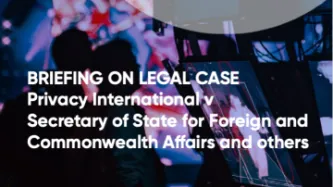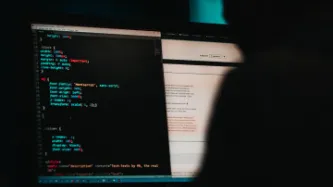Search
Content type: Long Read
Zimbabwe has a history of state led surveillance that is carried out more for political gain than for the investigation of legitimate criminal activities. During former President Mugabe’s 37 year rule the government used laws and state security structures to carry out targeted surveillance of persons of political interest and more generalised mass surveillance of the population.
Specific laws such as the Interception of Communications Act as well as mandatory SIM-card registration regulations…
Content type: News & Analysis
Introduction
The European Parliament has adopted a nonbinding resolution against the use of artificial intelligence (AI) by law enforcement in public spaces and a ban on facial recognition databases, such as the ones used by Clearview AI.
It is a significant and hugely welcome step in an ongoing campaign to ensure the EU leads the world in protecting against dangerous applications of AI within its borders.
The Resolution recognises the need to safeguard against application of AI and mass…
Content type: News & Analysis
After almost 20 years of presence of the Allied Forces in Afghanistan, the United States and the Taliban signed an agreement in February 2020 on the withdrawal of international forces from Afghanistan by May 2021. A few weeks before the final US troops were due to leave Afghanistan, the Taliban had already taken control of various main cities. They took over the capital, Kabul, on 15 August 2021, and on the same day the President of Afghanistan left the country.As seen before with regime…
Content type: News & Analysis
As Amnesty International and Forbidden Stories continue to publish crucial information about the potential targets of NSO Group’s spyware, we know this much already: something needs to be done.
But what exactly needs to be done is less obvious. Even though this is not the first time that the world has learned about major abuses by the surveillance industry (indeed, it’s not even the first time this month), it’s difficult to know what needs to change.
So how can the proliferation and use of…
Content type: Long Read
Additionally, in January 2020 Privacy International and UK-based NGO Liberty filed a new claim against MI5 and the Secretary of State for the Home Department in the Investigatory Powers Tribunal (the “Ungoverned Spaces Case”, this time, the case sought to hold MI5 and the SSHD accountable for systemic, long-term failures in the way they handle and retain millions of people’s personal data. As part of this claim, PI requested that the IPT re-opens parts of the original BPD/BCD. This aspect of…
Content type: Examples
During the Black Lives Matter protests of summer 2020, US police took advantage of a lack of regulation and new technologies to expand the scope of people and platforms they monitor; details typically emerge through lawsuits, public records disclosures, and stories released by police department PR as crime prevention successes. A report from the Brennan Center for Justice highlights New York Police Department threats to privacy, freedom of expression, and due process and the use of a predator…
Content type: Report
In Israel/Palestine, the Israeli government has been deploying biometrics, including cutting-edge facial recognition technology, in the name of counter-terrorism. The Israeli state routinely surveils and severely restricts Palestinians’ freedom of movement using myriad technologies, including biometrics, which result in furthering the policies of systemic segregation. Since many Palestinians live under Israeli occupation, they have little control over the way their sensitive data is turned…
Content type: Long Read
The Grand Chamber of the European Court of Human Rights ruled that the UK government’s historical mass interception program violates the rights to privacy and freedom of expression. The Court held that the program “did not contain sufficient “end-to-end” safeguards to provide adequate and effective guarantees against arbitrariness and the risk of abuse.” As a result the Court ruled that UK law "did not meet the “quality of law” requirement and was therefore incapable of keeping the “…
Content type: Long Read
On 25 May 2021, the European Court of Human Rights issued its judgment in Big Brother Watch & Others v. the UK. Below, we answer some of the main questions relating to the case.
After our initial reaction, below we answer some of the main questions relating to the case.
NOTE: This post reflects our initial reaction to the judgment and may be updated.
What’s the ruling all about?
In a nutshell, one of the world’s most important courts, the Grand Chamber of the European Court of Human…
Content type: Press release
The Grand Chamber of the European Court of Human Rights has today ruled that UK mass surveillance laws violate the rights to privacy and freedom of expression.It found that:The UK’s historical bulk interception regime violated the right to privacy protected by Article 8 of the European Convention on Human Rights and freedom of expression, protected by Article 10. Particularly it found that:the absence of independent authorisation,the failure to include the categories of selectors in the…
Content type: Video
On 6 February 2021, the Constitutional Court of South Africa in a historic judgment declared unconstitutional years of secret and unchecked surveillance by South African authorities against millions of people - irrespective of whether they reside in South Africa.
The Court powerfully placed the judgment in historical context:
The constitutionally protected right to privacy seeks to be one of the guarantees that South Africa will not again act like the police state that it was under apartheid…
Content type: Long Read
What’s the ruling all about?The Constitutional Court of South Africa in a historic judgment declared that bulk interception by the South African National Communications Centre is unlawful and invalid. Furthermore, the Constitutional Court found that the Regulation of Interception of Communications and Provision of Communication-Related Information Act (RICA) 1) was deficient in failing to provide at least a post-notification procedure for subjects of interception; 2) failed to ensure the…
Content type: News & Analysis
Today, the Constitutional Court of South Africa in a historic judgment declared that bulk interception by the South African National Communications Centre is unlawful and invalid.
The judgment is a confirmation of the High Court of South Africa in Pretoria’s powerful rejection of years of secret and unchecked surveillance by South African authorities against millions of people - irrespective of whether they reside in South Africa.
The case was brought by two applicants, the amaBhungane Centre…
Content type: Long Read
On 8 January 2021, the UK High Court issued a judgment in the case of Privacy International v. Investigatory Powers Tribunal. The Secretary of State for Foreign and Commonwealth Affairs and Government Communication Headquarters (GCHQ) appeared as interested parties to the case.
After our initial reaction, below we answer some of the main questions relating to the case.
NOTE: This post reflects our initial reaction to the judgment and may be updated.
What’s the ruling all about?
In…












